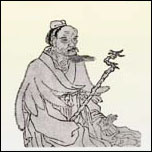 Chuang Tzu (369 BC-286 BC) |
Chuang Tzu
On Peace & Repose
|
|
The repose of the Sage is not what the world calls repose. His repose is the result of his mental attitude. All creation could not disturb his equilibrium: hence his repose. When water is still, it is like a mirror, reflecting the beard and the eyebrows. It gives the accuracy of the water-level, and the philosopher makes it his model. And if water derives lucidity from stillness, how much more the faculties of the mind? The mind of the Sage being in repose becomes the mirror of the universe, the speculum of all creation.
Repose, tranquillity, stillness, inaction—
The true Sage, when in obscurity, causes those around him to forget their poverty.
Thus, although silent, he can instill peace; and by his mere presence cause men to be
The true Sage is free from all embarrassments. All things are to him as One.
Chuang Tzu, Chapter XXV: Tsê Yang, pp. 248-249
Chuang Tzu (369 BC-286 BC) |
| Top of Page | Contents | Resources | Art | Books | Essays | Exhibits | Music |
| Nobel Peace Prize | Philosophy | Poetry | Quotes | A-Z Portals | Home |
| © Peter Y. Chou, WisdomPortal.com P.O. Box 390707, Mountain View, CA 94039 email: peter@wisdomportal.com (3-8-2003) |
 |